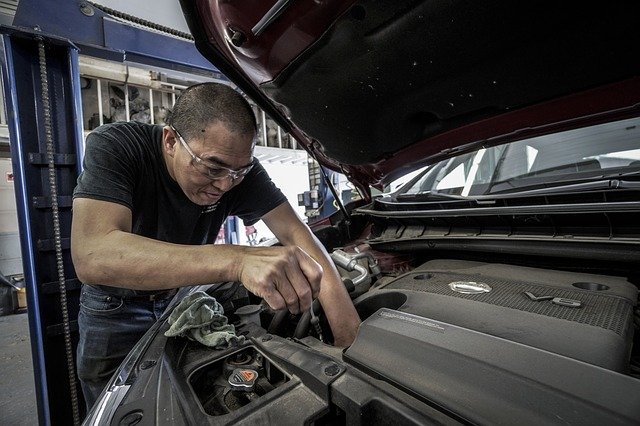How much does car engine repair cost?
Article by Matilda Douglas-Henry
Your engine is the
heart of your vehicle: it keeps your car running, and relies on a variety of
mechanisms to do so safely. Driving with a weak or struggling engine is never a
good idea, and sets you up for costly and time-consuming repairs down the road.
Today we will discuss the many elements of car engine repair, including:
- The different parts of a car engine
- Common problems for engines
- Signs that your engine is in trouble
- The cost of engine repair

What are the different parts of a car engine?
Your car’s engine has many different components that must be performing at a high and consistent standard to ensure the smooth running of your vehicle. A standard car engine is fitted out with these main parts:
- The engine block, essentially the engine where the combustion occurs (all other parts are connected to the block);
- Pistons that pump up and down and compress the air and fuel, which is transferred to the tyres by the transmission and makes them spin;
- A cylinder head attached to the top of the engine block that sections it off and prevents gas from escaping;
- A crankshaft, which is an energy converter at the bottom of the block;
- A camshaft that opens/closes the valves;
- Valves (both intake and exhaust) that regulate the air, fuel and fumes in the cylinder head;
- The oil pan located at the bottom of the engine that stores all the oil used to lubricate[1].
What are common problems that my engine might face?
Before we start this section: there are many operational systems and substances that your engine relies on to keep it working. When these are maintained and serviced regularly, they can often help you avoid costly engine repairs. If these elements aren’t working properly, your car will show the telltale signs of engine trouble, and if left unattended can have dire and expensive consequences.
Your engine is constantly going through a complex set of processes to keep your car safely running at its many different speeds—as such, the tiniest screw loose can pose major problems. Here are some of the most common engine issues.
Oil trouble
Oil is the engine’s elixir of life. If your vehicle is serviced within the recommended timeframes, one of the first things a mechanic will do is assess your oil levels. Poor lubrication and oil debris occur if your oil is old or dwindling and has not been changed enough, or the filters haven’t been regularly cleaned. A failing oil pump will also prevent your engine from being lubricated properly.
Leaking or old engine coolant
Coolant—you guessed it—keeps your engine at a stable temperature; if coolant is leaking or hasn’t been changed recently, your engine can overheat. Leaking coolant can stem from the reservoir that stores excess coolant, or something more severe like a blown radiator hose or warped head gasket. If your coolant is too old the engine radiators can become blocked with sediments and deposits. Like oil, coolant needs to be inspected during your routine services, and drained and refilled entirely if there are any issues.
Poor fuel and air compression
Weakened fuel and air compression can happen because of other parts experiencing extensive wear and tear; broken valve seals, worn-out piston rings, and cylinders with holes can cause air to seep out.
Too much heat in combustion chamber
The combination of high heat and too much pressure can cause a spark knock. This means that your engine detonates and can cause serious injury to your pistons, piston rings and head gaskets.
Worn-out spark plugs
A more common issue
with older cars, spark plugs spark the
compressed fuel in the engine. If they are too old, the ignition might not be
able to activate and the engine can misfire, which can create long-term damage[2].
What are some signs that my car’s engine is in trouble?
It’s all well and good to have a vague idea of the internal problems your engine might be experiencing, but the most important part is being able to identify them. While we are firm believers in getting all ostensible car issues assessed by a trained technician, drivers should be mindful of all sensory warning signs, especially when behind the wheel.
If your car’s engine needs help, you should look out for:
- A knocking noise while driving (too much heat in combustion chamber);
- Sputtering sound (lack of compression);
- A burning smell while driving;
- Steering transmission hard to control;
- More power required to brake;
- Brown liquid dripping from the bottom of the vehicle (oil leak)
- White, blue, or grey smoke from the exhaust;
- A noticeably hot engine;
- Discoloured oil (coolant leak).
How much does engine repair cost?
Oil leak repairs cost between $250 and $1,000, and can increase depending on the complexity of the
required repairs. Expect to pay a higher price point if major components of the
engine or transmission need to be removed to access the leak[3]. An oil and filter change costs between $150 and $300.
If your coolant reservoir needs to be replaced, it typically costs between $150 and $350, and can become more expensive depending on the make and model of your vehicle[4]. Radiator hose replacement will cost between $225 and $350[5]. A replacement radiator will cost approximately $300.
On the pricier side of things: the cost of head gasket repair or replacement is between $800 and $3,200 with an average price of $1,200[6]. A camshaft replacement requires a lot of labour, and costs between $1,500 and $3,000.
If your engine needs to be replaced entirely, a
reconditioned one will cost approximately $4,000[7].
Conclusion
We hope this article
has been helpful in capturing just how important it is to get your engine
serviced regularly, and to keep an eye (and ear) out for any warning signs that
there may be internal problems. If you see that engine light on the dashboard,
don’t wait another moment! Use DingGo’s quick quotes service today.
